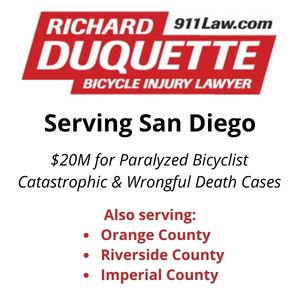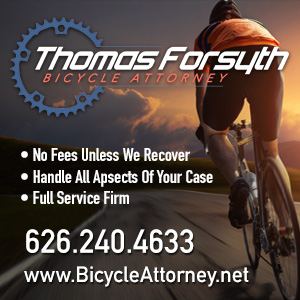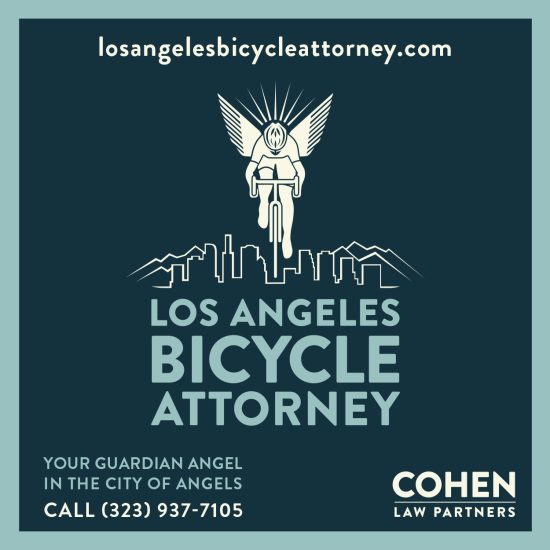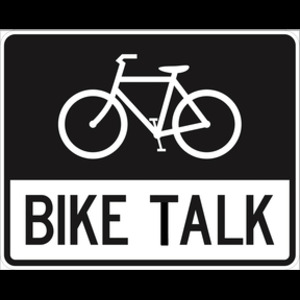
Scroll down for news of the first ever BikingInLA/LACBC group ride on Sunday, Feb 6
Strange how life works out sometime.
I was riding around the Marina on my way to Ballona Creek when I spotted a rider down on the side of the road. Next thing I knew, the other rider with him was chasing after a beat-up pickup that had just pulled out of the lot behind them.
Fortunately, the driver stopped to argue with the other rider, which gave me time to call 911. The driver insisted he didn’t hit anyone, while the rider, a man named Craig, I later found out, demanded he pull over right away.
Meanwhile, I was on the phone with the 911 operator, who completely understood when I interrupted as she answered, asking her to write down the license number before the driver could get away. So she listened patiently while I carefully read the plate digit by digit, then repeated it back to me before asking where I was or what happened.
I don’t know who she was. But I do know that if I ever need help, I hope she’s the one who answers the call.
She passed me on to the sheriff’s department, who passed me onto the highway patrol; for some reason, they investigate traffic collisions in the area, even though the Marina sheriff’s station was just two blocks away.
Meanwhile, the driver finally pulled back around and parked his truck. As he walked past, he looked at me, still on the phone with the CHP dispatcher, and said “I didn’t hit him! I only brushed him a little bit.”
To which I responded. “Brushing him is hitting him.” And then into the phone, I asked “You heard that, right?”
As we waited for the highway patrol to arrive, I pulled out my first aid kit and did my best to patch up the first rider, named Jeffery, who fortunately only seemed to have cuts and scrapes. I did my best to talk him into letting the paramedics come take a look; my experience is that once the adrenalin and other stress hormones wear off, it often uncovers more serious injuries.
Which is why I always recommend getting medical care after a collision. Because chances are, you’re hurt worse than you think. You just don’t know it yet.
He declined, though. So once I got off the phone, they explained what had happened.
They were chatting in the parking lot of the shipbuilder after both had visited there. The truck driver had come up behind them, and demanded that they get out of his way — while talking on his cell phone, of course.
Not an unreasonable request under the circumstances. But the driver didn’t wait for them to get out of his way; instead he stepped on the gas as soon as he thought he had an opening.
He didn’t.
His truck ran over the rear wheel of Jeffrey’s bike while he was still straddling it. The bike went down, and so did Jeffrey. All because an impatient driver wasn’t willing to wait the extra second or two that it would have taken a couple of men to get out of his way.
After a lot of discussion, the driver seemed to take responsibility for his actions, exchanging insurance information and offering to pay for the bike. Although he continued to look at the damage to the bike, such as a shredded rear tire, and insist that he couldn’t have done that.
As if any cyclist would have been able to ride anywhere with the sidewall of his tire ripped out on both sides.
The interesting thing, though, for me at least, came as we continued to wait for the CHP to arrive — which never happened while we were there, despite waiting nearly an hour after the 911 call.
As we talked, I mentioned that I was with the L.A. County Bike Coalition. The injured rider, Jeffrey, said he’d just gotten an email from the LACBC about an upcoming ride. Something about a 30 mile ride through the Westside set to begin at the Santa Monica Pier on Super Bowl Sunday.
“Yeah, I know,” I said. “I’m leading it.”
In fact, that’s why I’d been there to help, because I was checking out the route I’d planned.
One more thing, though, before I change subjects. There were two cyclists about 20 yards ahead of me when all his happened, who should have been in perfect position to see the collision. So if you happened so see a truck hit a cyclist in front of one of the shipbuilders on Fiji Way Friday afternoon, let me know.
.………
Now then, about that ride.
Mark your calendar for Sunday, February 6th, when I’ll host my first ever group ride as part of the LACBC’s new Sunday Funday Rides.
Since it will be in February, and just a week before Valentines Day, we’ll be riding in search of the beauty and romance West L.A. and its surrounding cities with a ride themed “I ♥ the Westside.”
We’ll meet at the Santa Monica Pier at 9:30 am, and start rolling at 10. The ride will take in Main Street and the sharrows on Abbott Kinney before working our way up to Culver City and Beverly Hills, then down through Brentwood and Santa Monica, before heading back along the coast to the pier.
At least that’s plan; construction on the Ballona Creek bike path already threatens to throw a monkey wrench in that segment, so some flexibility may be in order.
While I’m still working out the exact route, we should be looking at a total distance of around 30 to 35 miles from start to finish. The course will be mostly flat, with a moderate pace, and best suited for intermediate riders or above. It should last about three hours, allowing for stops along the way — which should have you home well before kickoff of the Super Bowl.
It gets cold at the beach on February mornings, so dress warmly — preferably in layers you can remove as we move inland and the day warms.
And yes, despite what my wife might tell you, I do have enough sense to come in out of the rain. So in the event of bad weather, we’ll postpone or cancel.
The ride is free to LACBC members, and you’re allowed to bring one guest. If you’re not a member and want to ride along, we’ll sign you up on the spot at a reduced rate.
So if you’ve ever want to ride with me, this is your chance.
.………
This week’s upcoming events —
Bike Talk airs Saturday at 10 am; listen to it live or download the podcast from KPFK.
Bike Talk is also holding their first-ever benefit event on Saturday, January 15th from 7:30pm-midnite at Vlad the Retailer, 4314 Melrose Ave., at the intersection of Heliotrope & Melrose. Admission is just $10, with food, music, door prizes and Fat Tire Ale on tap.
Bikerowave is offering a free bike-fitting workshop at 6 pm Saturday, January 15th at 12255 Venice Blvd. Los Angeles CA; RSVP to info@bikerowave.org.
Streetsblog joins with KPCC, American Institute of Architects, Pasadena and Foothill Chapter, and Pasadena Magazine to discuss Planning the Future of Our Streets from 7 to 9 pm on Tuesday, January 18th at the Crawford Family Forum at 474 South Raymond Street in Pasadena.
Also on the 18th, the LACBC is calling on cyclists to support the proposed Main Street road diet at the board meeting of the Venice Neighborhood Council, from 7 – 10 pm, at 1010 Abbot Kinney Blvd in Venice.
Click on the Events page for more upcoming bike events.
.………
The city is offering a $50,000 reward in the murder of 14-year old Taburi Watson, who was shot while riding his bike just before New Years. Anyone with information is urged to call 77th Division Criminal Gang/Homicide Detectives at 213/485-1383. Thanks to George Wolfberg for the tip.
.………
Streetsblog looks at LADOT’s bike applications in Metro’s Call for Projects. Usually bike-friendly Councilmember Bill Rosendahl acts as a committee of one to cut the heart out of the Wilshire BRT, the proposed bus (and bike) only lane. To the surprise of no one, Manuel Gallegos, the cyclist who recorded apparently violent police action at the May Critical Mass, filed suit against the city. A look at the January Downtown Art Walk, and an exhausted pedi-cab driving Josef Bray-Ali. An update on last week’s meeting of the UCLA Bicycle Academy. Matthew Ruscigno reminisces about the 2010 Feel My Legs, I’m a Racer, and says the date of this years competition is still up in the air. The revitalization of the L.A. River could be derailed by the Union Pacific Rail Yards. The Claremont Cyclist diagnoses a few cases of Auto-Dependency Syndrome. Friends react to the death of Kevin Unck, the champion masters cyclist killed when he lost control of his bike and slid in front of an oncoming SUV last Sunday.
A driver is expected to get a slap on the wrist for killing a cyclist, despite driving with a known history of seizures. A violent alleged shoplifter leads SF police on a wild bike pursuit. A Sacramento cyclist is killed in yet another hit-and-run, while San Luis Obispo rider died five days after getting hit by a truck.
U.S. DOT Secretary Ray LaHood meets with cyclists, and voices his support for cycling; you wouldn’t see that under a Palin administration. Arizona considers an Idaho Stop bill, allowing cyclists to treat stop signs as yields. Tucson Velo looks at winter riding in my hometown. Hoboken says the speed limit may be 25 mph, but 20 is plenty. A NJ legislator withdraws her bill to put license plates on bikes, while New York’s most biased bike-hating major daily cheers a proposal to stick ID tags on bikes. A truck driver is convicted of entering the country illegally, but walks on killing a cyclist; is it just me, or is that horribly backwards?
How to ride offroad more responsibly. A fear of London traffic appears to be behind the lower than expected use of the city’s new bike share program. A photographic view of cycling in Oxford; definitely worth checking out. A Parliament member from Cambridge breaks his arm while riding Down Under. The 2011 Vuelta will ride through the beautiful — and sometimes restive — Basque country. A look at the Tour de France back when men were men and rode their bikes that way.
Finally, the reader who wrote in last month asking for help finding a 64-65 cm lugged steel frame emailed today to report that he’d found — and won — exactly what he was looking for.
Ride it in health. And keep the rubber side down.
Like this:
Like Loading...












